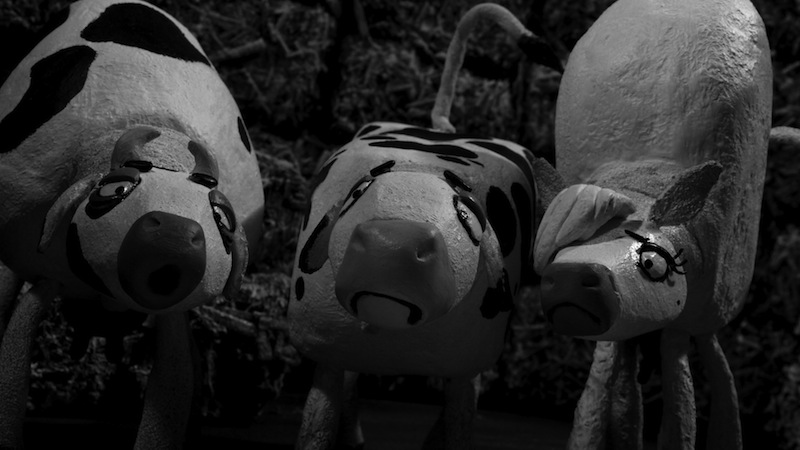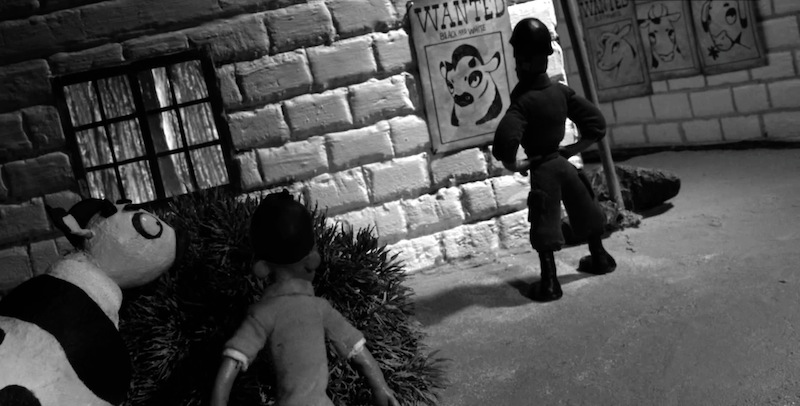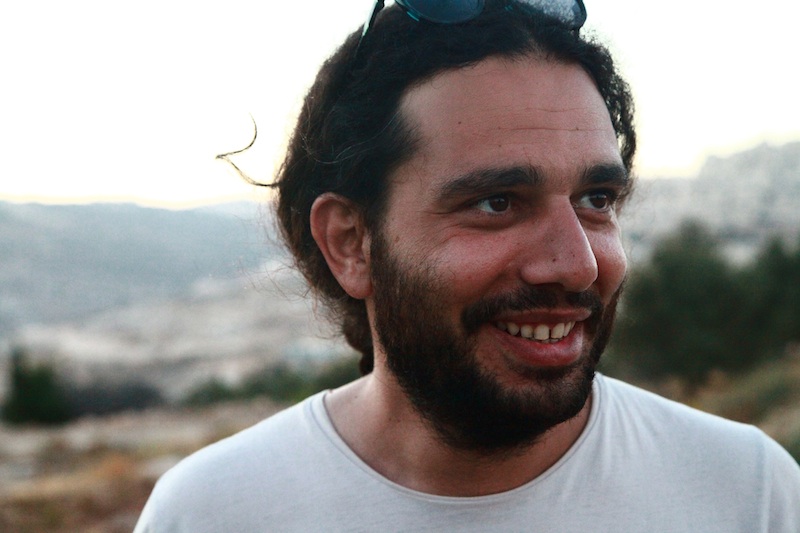“Maybe you think all cows are the same — that they are stupid and lazy with nothing going on in their heads. Maybe you should think again.”
With that opening salvo, the ingenious and deeply absorbing NFB documentary The Wanted 18 grabs you by the soul and never lets go. It’s premiering at Toronto’s international film festival, which begins on Sept. 5.
The 75-minute film, co-directed by Palestinian artist Amer Shomali and Montreal helmer Paul Cowan, sifts through the first popular uprising in the West Bank in 1987, utilizing the perspective of four cows — which are illustrated using graphics and animation.
Shomali, who runs a studio in Ramallah, said he felt the cows would provide a “fresh point of view” on the conflict, which has a polarizing nature. The animals become an objective force.
“Audiences view these unexpected main characters without preconceptions and sympathize with them, whatever their background — how can you not, when you look into the beautiful cow’s eyes? — [they are] characters who can lead the audience through the story,” said Shomali in an email.
Activists in Shomali’s village of Beit Sahour, a suburb of Bethlehem, decided to create a co-operative dairy farm and launch a boycott of Israeli goods and services.
“The only thing they don’t control is the air we breathe,” noted one of the film’s subjects. Everything is bought from Israeli sources, including the water and electricity. Taxes are paid to the Israeli state.
Residents refuse to pay their taxes and utility bills. They start community gardens and instead of purchasing milk from an Israeli company, they buy 18 cows from a kibbutz.
“It was 10,000 people giving Israel a headache,” according to the film.
Cows with personality
Combining stop-motion animation, interviews, drawings and archival material, The Wanted 18 brings to life the struggle of the uprising, the personal stories of the activists, Israeli commanders who managed their government’s response and most intriguingly, the perspective of four of the cows who are also matched by personalities: Rivka the peacenik, Ruth who didn’t like Palestinians, Lola the pregnant sexy one and Goldie, the youngest.

Credit: The Wanted 18 (NFB)
Shomali said he found his biggest challenge was to mix all the “different realities.”
“Interviews, drama, animation, comics and archives; jumping back and forth…from fantasy to archives from a sad reality to a farting cow [and] turning it all into one continuous story.”
At the start, the “lactivists” — a polyglot of professionals including a pharmacist and an engineer — are overwhelmed by the care of the cows. The section about transporting the cows to the West Bank is frenzied and funny. Eventually, they get their milk co-operative going.
Families started to have picnics at the cow farm — it was a gathering place. And soon, the cows became a beacon of the revolt as Israeli authorities slapped curfews, confiscated cars and furniture in lieu of non-payment of utility bills and made daily arrests of activists, especially those involved in the cow farm.
“Food and money are nothing. We wanted recognition,” states one of the lactivists.
“Our whole society was brought together.”
The uncertain fate of the cows was smacked with stark reality the day soldiers came to the farm and declared: “These cows are dangerous for the security of the State of Israel.”
The lactivists were given 24 hours to get rid of the cows — to butcher them.
Instead of capitulating, the cows are secreted away in peoples’ houses. The lactivists manage to make deliveries during the curfew as the pharmacist made his rounds delivering “medications.”
The cows become the focus of an eight-day search by Israeli forces. I will not reveal how it ends but there is an underlying fairytale-like tone to the story. Obviously, what happened in the time of the intifada is not magical and the history lesson is acutely painful.

Credit: The Wanted 18 (NFB)
At this point, the film’s tone changes and it comes more like a thriller with real consequences. While the four cows add jocular colour to the documentary, the filmmakers manage a balance between irreverence, solemnity, humour and passion, blending the animation almost seamlessly with true events and interviews with those involved. It’s a remarkable feat considering the topic.
Raid, Israeli soldiers
One of the harder elements was nabbing interviews from the Israeli side. It took three years to get Israeli officers from that time period to get on board. In the film, they are frank and show a degree of respect for the Palestinians they were ordering around. Cowan said he was “surprised by their candour.”
“As human beings I thought they had some sympathy for the Palestinian cause. As Israeli citizens they had less sympathy. As military men, they did what they had to do during the intifada and had no regrets. Losing, for them, was not an option,” said Cowan.
There were other struggles in making the film, one of which was a raid on the house of the film’s prop master two days before the shoot (props were taken and never returned) and also the confiscation of one of three Israeli jeeps being used for dramatic re-creations.
“We were sure the Israelis were on to us,” Cowan said. “We get one of the other two [jeeps we had left] and kept it hidden till the day of the shoot. On that day, an Israeli platoon magically entered Beit Sahour … everybody got a bit tense [so] we went to another part of town, did the scene and got away with it.”
Cowan said he admires the ability of the Palestinians “to keep an even keel even as the ship is sinking,” calling the entire shoot “chaotic.”
Shomali recalls the free-form nature of the shooting, with locals on set exchanging tales from that time.
“They’d tell a story that Paul and I would love on the spot and then we’d shoot it next.”
Cowan deemed the neighbourhood a giant, open set. Everyone was willing to help or even to open up their houses, Shomali revealed.
“I’d just point to any balcony and say I wanted the camera up there and in five minutes, it was,” noted Shomali.
The main characters, now looking like grandfathers, sent their sons or a relative to play their younger selves.
‘Not hateful’
Cowan, on his end, hopes the film provides a more expansive view of Palestinians.
“Through all this they are not hateful,” observed Cowan. “Any political solution must start with a belief that Palestinians are the same as us, with the same aspirations — and with the same rights.”
But considering the recent Israeli offensive on Gaza, Cowan gets somewhat gloomy as he recounted a dinner the filmmakers had in Ramallah with “several very smart Palestinians” early on in the production.
“I asked one of them how long he thought it would take for Palestine to gain independence. He said ‘A hundred years…’ Now I think he was being optimistic.”
Shomali’s views are more impassioned.
“You might think humanity is beyond this point. But I am shocked that it is not: it is happening every day, everywhere,” he wrote. And according to him, by the time the first ceasefire was announced, in 27 days, “one Palestianian [had been killed] every 23 minutes.”
Yet the artist retains the eternal buoyancy that Cowan ascribes to Palestinians. Asked what he wants audiences to take away from The Wanted 18, Shomali responds:
“Hope.”
The film launches at TIFF and will then go on the festival circuit. It will eventually be put on NFB.ca for free viewing.
Sept. 6, Scotiabank, 8:15 p.m.
Sept. 9, Bloor Cinema, 2:30 p.m.
Sept. 12, Scotiabank, 5:30 p.m.
June Chua is a Toronto-based journalist who regularly writes about the arts for rabble.ca.



